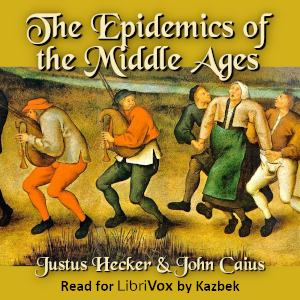
Justus Friedrich Carl Hecker (1795-1850) was a German physician and medical writer, whose research focused on the history of epidemics, in a broad sense of the term that included pandemics like the Black Death as well as the group of social phenomena known as dancing mania. The Epidemics of the Middle Ages comprises three of his works — The Black Death, The Dancing Mania, and The Sweating Sickness — translated by the English epidemiologist Benjamin Guy Babington. Despite what the name of the book may suggest, the events it describes are not limited to the Middle Ages.
The Black Death recounts the history of the bubonic plague in Europe, with particular attention to its cultural ramifications, such as the Flagellant movement and persecution of the Jews. The Dancing Mania describes mysterious social phenomena that occurred mainly in Europe between the 14th and 17th centuries, in which groups of people engaged in apparently uncontrollable dancing. The nature of the dancing mania continues to be a subject of debate, and Hecker’s book remains one of its most comprehensive descriptions. The Sweating Sickness was a series of epidemics that struck England and later continental Europe during the 15th and 16th centuries. Hecker’s account pays particular attention to its impact on political history.
Hecker’s books were written before the germ theory of disease became widely accepted. While his accounts of epidemics are based on critical examination of historical evidence, modern readers are likely to disagree not only with his epidemiological theories, but also with his assessments of the evidence itself. These disagreements can provide a striking illustration of how the prevailing views of one’s time may affect one’s judgements about credibility of primary sources.
The audiobook includes appendices which contain source materials, including (for The Sweating Sickness) a 1552 treatise by the English physician John Caius and (for The Dancing Mania) examples of music as well as short texts in Latin, German, and the early modern German dialect of Cologne.(Summary by Kazbek)

Other Audiobook
Audiobook: Lives Of The Most Remarkable Criminals Who have been Condemned and Executed for Murder, the Highway, Housebreaking, Street Robberies, Coining or other offences
“If there be a haunted spot in London it must surely be a few square
Audiobook: Human Boy
This collection of eleven short stories, both humorous and touching, about English school boys was
Audiobook: Young Folks’ History of the American Revolution
This work has grown out of the desire frequently expressed to the writer when he
Audiobook: The Life of the Spirit and the Life of Today
Underhill emphasizes the practical, here-and-now nature of spiritual life. She argues that spirituality is a
Audiobook: Insolación
Insolación es una obra de Emilia Pardo Bazán publicada en 1889. Novela muy polémica en
Audiobook: Treasury of David, Vol. 2 (Abridged)
Charles Spurgeon was a British Particular Baptist preacher who remains highly influential among Christians of
Audiobook: Shadow of the North
“The Shadow of the North,” while an independent story, in itself, is also the second
Audiobook: “Mind The Paint” Girl
Another Pinero play from the early 1900s. With a social message about the effects of
Audiobook: Editorials from The Dial magazine, Volume 66
Editorials published in Volume 66 of The Dial magazine, a fortnightly political and literary review.
Audiobook: Stone Axe Of Burkamukk
Mary Grant Bruce was an Australian children’s writer who spent one year collecting Aboriginal stories
Audiobook: Myths and Legends of Alaska
Editor Katharine Berry Judson collates and presents a narrative history of Alaskan Myths. Originally gathered
Audiobook: Ὁμήρου Ὀδύσσεια (Ραψῳδία 11) – The Odyssey (Book 11)
Ἡ Ὀδύσσεια τοῦ Ὁμήρου ἐντάσσεται στὰ πλαίσια τῶν ἐργασιῶν πού ξεκίνησα ἐδῶ καὶ μερικὰ χρόνια